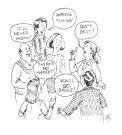Post-Modern Creative Destruction
My last post ended with a glancing reference to Joseph Schumpeter, and a teaser for “further thoughts” regarding how a free people, living in the greatest country in human history, came to relinquish their sovereignty to unelected, black-robed solons. Schumpeter (1883-1950) was an Austrian school economist, not a sociologist, legal scholar, or political theorist. However, back in the “old days,” economics was more than graphs and equations; economics aspired to be a comprehensive explanation for human behavior. Good economists, such as Schumpeter and Friedrich Hayek, necessarily ventured—sometimes with great prescience—into history, philosophy, and even psychology as a guide to social interaction.
To Schumpeter, “creative destruction” meant more than the disruptive effects of economic change and technological innovation. Schumpeter believed that capitalism was doomed by its own success because, as a society becomes more prosperous, educated, and comfortable, it inevitably falls under the influence of an intellectual class hostile to the values that enable capitalism to flourish—individual liberty and responsibility, private property, competition, and bourgeois institutions such as religion and the traditional family. As he wrote in Capitalism, Socialism and Democracy, “The bourgeois fortress thus becomes politically defenseless” in the face of “almost universal hostility to its own social order.”
The motivation for this hostility—then and now—is two-fold: (1) resentment of the superior economic rewards earned by entrepreneurs, and (2) the desire for greater power. No matter how affluent a society becomes, inequalities of distribution will always lead to resentment by those earning less—a perception of “relative deprivation.” The intellectual class is uniquely suited to give voice to “real or imagined grievances” because, in Schumpeter’s words, hostility to a social order depends for its success on “groups to whose interest it is to work up and organize resentment, to nurse it, to voice it and to lead it.” He was uncannily predicting identity politics and the rise of the liberal elites that would come to dominate academia and the media. Schumpeter was primarily anticipating the rise of socialism, but the trends he identified explain much about our current predicament. And despite his gloomy forecast, Schumpeter did not anticipate the full extent—or the ultimate target—of the intellectuals’ hostility.
The post –industrial “intellectual class” (a concept Irving Kristol developed into the “New Class”) does not promote socialism, but economic redistribution and something more corrosive than socialism— nihilism. The New Class—which defines modern liberalism—dominates the most influential spheres of modern society. They utterly control higher education and thrive in the burgeoning public sector, wielding as their tools the now-familiar goals of affirmative action, environmentalism, diversity, feminism, social justice, multi-culturalism, gay rights, “reproductive freedom,” and other euphemistic causes du jour. All of these movements share a common objective: undermining the bourgeois social order created by capitalism and replacing it with a secular welfare state (and libertine culture). Organized religion, and traditional morality in general, are impediments to this new secular order, because they represent an alternative source of authority and also discourage the nihilists’ primal urge—immediate gratification (especially sexual gratification).
In the 21st century, the left’s hostility is not aimed primarily at capitalism, but at organized religion and traditional morality. This explains, for me, liberals’ jubilation over the decision in Obergefell, and the lack of any concern over the blatant judicial activism that produced it. It also explains the left’s hostility toward any legislative attempts to protect religious freedom, and the unseemly zeal of LGBT activists’ vow that the campaign for “marriage equality” is not over, but just beginning. Stripping objecting churches of their tax exemptions is high on their Robespierre-like agenda. Liberals celebrated the redefinition of marriage by five unelected judges, who unilaterally imposed their will on the American public, precisely because it was anti-democratic. To the New Class, Justice Kennedy and his liberal colleagues represent the Platonic Guardians who deliver the policies they desire without the need for elections.

